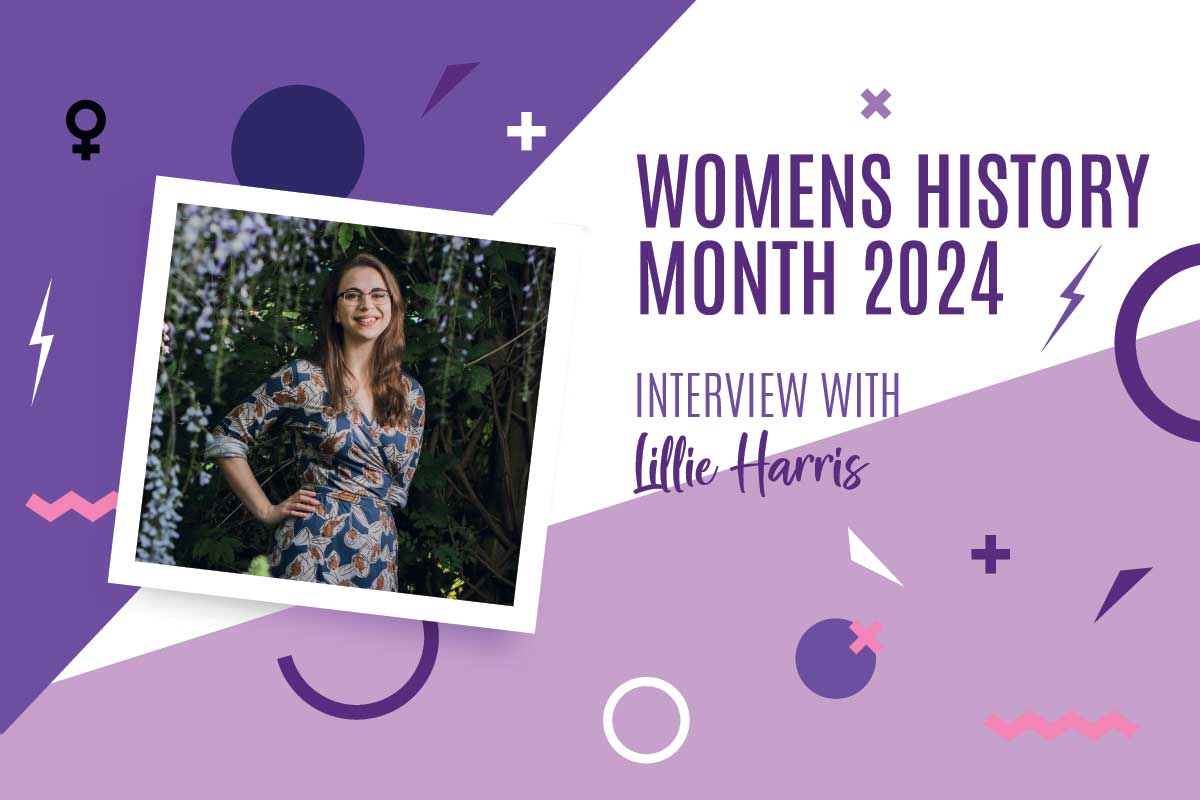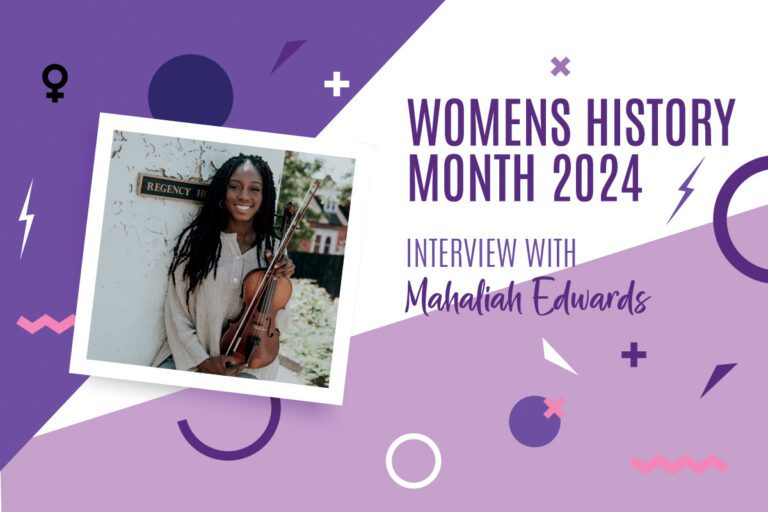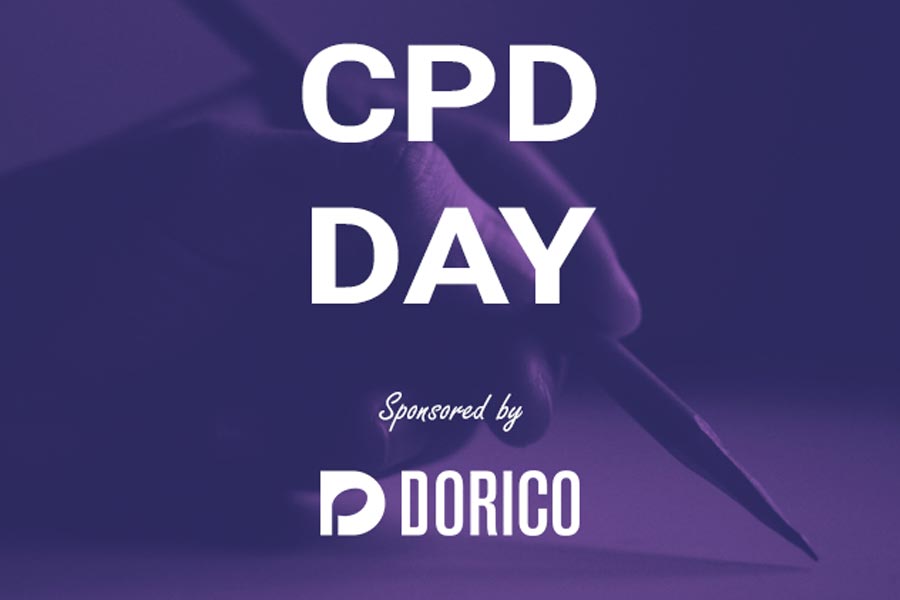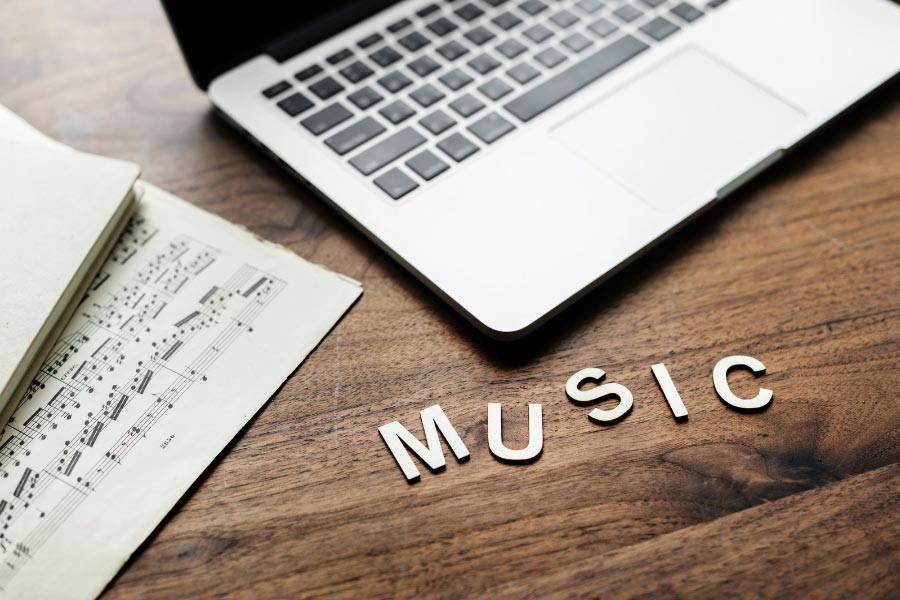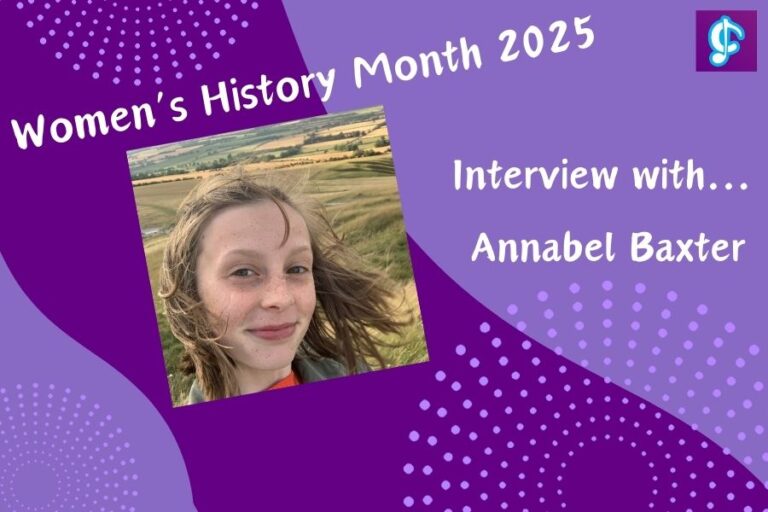Lillie Harris is a contemporary classical composer, engraver and copyist and manual writer for Steinberg’s Dorico notation software. We chatted about composing at school, women composers, walking for inspiration, procrastination and more…
How did your musical journey start?
When I was about 3-4 years old, I went to my sister’s primary school music concert. A guitar group performed, and I was captivated: I turned to my mum, and insisted I wanted to “do that”. She spoke to the guitar teacher afterwards (James D’Alton Bellas) who recommended that I be able to read English first! Which also set me on a path to loving reading, I suspect.
That was the initial spark, and then I picked up piano and flute soon afterwards (as my mum said I should learn an orchestral instrument; I’m not quite sure where that came from, perhaps a recommendation from a friend or our music teacher, as she didn’t have a musical background and we weren’t exactly going to orchestral concerts regularly!).
Were you encouraged to compose at school?
I was lucky to go to an independent secondary school (Kent College Canterbury, thanks to scholarships, bursaries, and my amazing mum) and the musical opportunities there were pretty great. GCSE Music was where “composing” first made an impression on me as a specific activity, I think, although my piano teacher Genevieve Wakelin (an amazing singer in her own right) says I often used to come to lessons with little tunes and ideas.
Composing at school was mostly done as part of the GCSE and A Level curriculum (I didn’t compose very much at school outside of that) but I was helped by Julian Ross, Head of Music at KC, when doing my conservatoire applications, for example.
It was the Sound and Music Summer School (which I attended in 2010-11) which really set me on the path towards composition; that was an amazing, formative experience!
Read about Lillie’s experience here.
As well as being a composer you’re a copyist and engraver – can you tell us what those are?
Engraving – this is the process of making music look beautiful, essentially. The term comes from when pages of music were physically carved onto plates of lead for use in printing presses.
That’s where terms like “rastral size” come from: the tool used to carve 5-line staves into the plate is called a “rastrum”. Making scores and parts look lovely has practical uses as well as aesthetic ones: human beings need to use them to perform music! So the size and layout of music on the page needs to be suited to the use-case (parts generally have bigger staves than scores, because the instrumentalists need to know exactly what notes to play and when, but only their notes; whereas the conductor needs to have an overview of what every part is doing, and to fit that all on the same page means making the music smaller).
Copying – this term comes from when instrumental parts had to be hand-copied from the full orchestral score, so it’s a bit outdated now that most music is notated digitally with parts that can be accessed inside the same file. ‘Music preparation’ is now often used to describe the role: taking a piece of music, and producing functional scores and instrumental parts (meaning, with suitable page turns, well-spaced music, everything clear and legible, and the exact number of physical copies required!). These days, a copyist/music-preparer is someone who combines digital engraving with printing and binding physical scores and parts.
You can read more about being a copyist in this interview with top copyist Jill Streater.
How did you become the manual writer for Steinberg’s Dorico notation software?
By a very happy accident! I had graduated from the Royal College of Music and was freelancing, just following my nose and seeing what happened. Part of that was setting up my website. Daniel Spreadbury commented on a social media post about it, and when I looked at Daniel’s profile, I saw they were looking for a Technical Writer. The description of who they were looking for sounded like me, to the letter! Even down to being part of Steinberg, as I had studied German up to A-Level and loved it.
I’ll always be grateful that Daniel and the team took on someone with no previous technical writing experience and who, until applying, hadn’t used their software! It’s perhaps a useful reminder that in music, there are so many jobs you might not have heard of until you find yourself doing them. (Engraving and music preparation were like that, too: I was doing and enjoying the work before I really knew what they were!)
What does a typical day look like for you?
On a day when I’m working at Dorico…
I’ll head into our office near Shoreditch. I luckily have a really pleasant commute, and use the travel time to turn into my work-self (and vice-versa in the evening; I like being able to compartmentalise) and either read the newspaper, a book, or reply to messages.
We have a short daily stand-up meeting in the morning, where everyone in the team summarises their work yesterday and today, any other meetings that might be of interest to other team members, etc.
If it’s not a day when I have other meetings, such as with the Manuals team in Hamburg, I’ll spend most of the day making progress on the manual: documenting new features, trying things out in Dorico, expanding existing explanations, drawing links between relevant areas – that sort of thing. If we’re in a translation phase, I might also have questions from our translators to answer.
I also check in on our forum and Facebook group, and answer questions if I can. It’s nice to solve problems! And I like to keep an eye on what sorts of things people haven’t been able to work out and what terms they use to describe the issue, as that might prompt revisions to the manual that will help other people in the future.
On composing days…
I’ll be at home (as that’s where the piano is!). I’ll probably take myself for a little walk in the morning, have a cup of tea, reply to a few emails or do a few bits of admin or small jobs – anything to put off sitting down at the piano and trying to make the notes fit together! (It’s amazing how this thing we “love doing” is so often the thing we procrastinate?!)
Realistically, I might achieve 2-3 composing “sessions” in a full day, with each session being around 30mins to 2 hours. I compose directly onto paper, mostly at the piano or from singing to myself, then type those sketches up digitally later. My pencil sketches can range from really clear in terms of time signature, rhythms etc to really, really vague! (The future-me who types up vague sketches does not like the past-me who wrote them.)
If I’m struggling with an idea, feeling uninspired, or simply because it’s the end of the day, I’ll head out on another walk: maybe taking a notebook with me, to force myself to sit on a bench somewhere and write something down. It’s a cliché for a reason! Walking puts your body into a comfortable, regular motion, and since our brains are a part of our physical bodies, we benefit from that rhythm – especially when we’re thinking about music. I have solved many, many composition problems on walks, and I will absolutely sing and talk to myself while walking to help the process. The end-of-the-day walk helps me run through what I did during the day, and either feel happy about what I’ve achieved, or feel clearer about what needs fixing tomorrow/next time I work on it.
In 2019 you were selected for the RPS (Royal Philharmonic Society) and National Youth Choir composer programmes – what did they involve?
They were both really excellent schemes, and I got a lot out of them.
2019 was the National Youth Choir’s first composer scheme, so we were all discovering what it might be as we went! We spent time with the choirs on their residential schemes in the Spring and Summer; had masterclasses and workshops with the Fellowship singers and amazing visiting composers including Jonathan Dove, Roxanna Panufnik, and Toby Young; did a composing retreat at the Red House; and ultimately recorded the new works we had written with both the full choir and Fellowship singers, which were released as an album with NMC. Incredible!
The scheme really put me back in touch with singing, the choral world, and how varied it can be. After one masterclass, Alexander L’Estrange challenged me to try composing a piece that an amateur choir could easily tackle, so I did (which became a piece called ‘Margaret’). I found leaning into a more consonant soundworld a very pleasant writing experience! With the benefit of the words coming across clearly for the audience listening, as well, which I think is important and satisfying for everyone.
The RPS scheme involved writing a new piece for Cheltenham Music Festival (originally planned for 2020, but it ended up being 2021 due to Covid), alongside a range of professional support/advice activities during the year: a session on copyright and contracts was particularly helpful (my notes from that are practically framed!). By happy coincidence, one of the available ensembles for the Cheltenham piece was a choir: I was absolutely loving composing for voices thanks to the NYC scheme, so I asked to do that (ultimately a piece called ‘The Dusk of Thee’), plus a short fanfare for the available brass soloist.
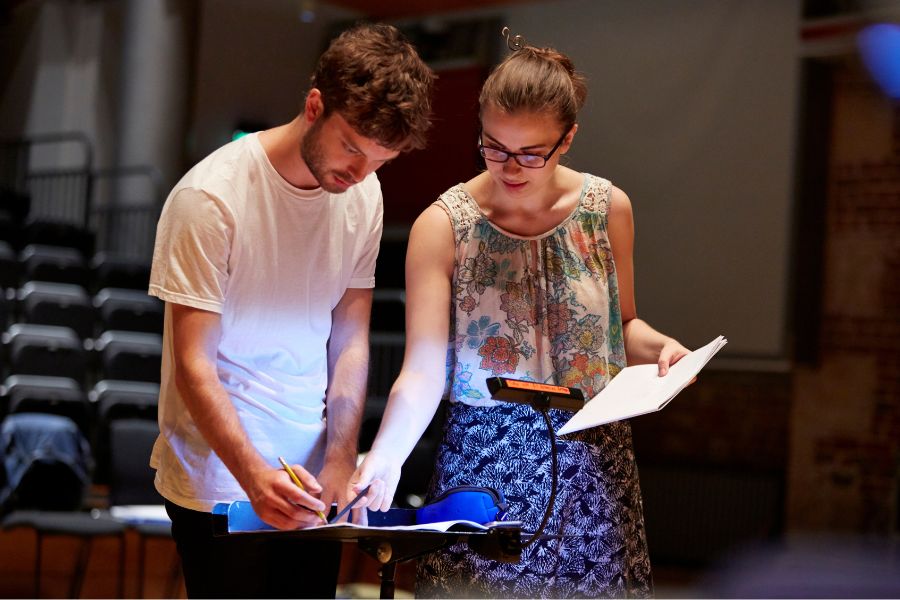
Image credit: Kevin Leighton
What does the landscape look like for women composers in 2024?
While there is still a way to go towards true equality for women in music, I think it’s important to acknowledge the progress made even in just the last few generations.
In 2024, it’s “normal” (in a societal context) for a young woman to study music at university. By which I mean, it’s not scandalous or considered “improper” for women to be educated, and people are generally more concerned with practical things like student loans, the same as for young men! Not that long ago, that in itself would have been unusual, if not banned (for example, around 150 years ago the first women admitted to study medicine in the UK weren’t allowed to graduate.
The disparity between the sexes in certain subjects, like composition, is still stark and I believe indicates an influence somewhere: whether that’s admission panels consciously or subconsciously thinking that music written by men “sounds better”; or going further back to childhood, with young girls not being offered music by female composers to learn or study, and thereby picking up the idea that composing is “something men do”.
I also feel anecdotally that it’s “easier”, or more expected, for teenage boys to jam together, have a go at being in a band, and write songs; but the same is not quite true for teenage girls, and so they’re missing out on the opportunity to hone their skills and interest in musical expression.
The historic legacy of women being excluded from professional, public music-making casts a long shadow (as covered in Anna Beer’s excellent book on female composers, ‘Sounds and Sweet Airs’) but I feel optimistic about shifting that Overton window! Every time an orchestra, ensemble, or choir performs a work by a woman with the same conviction as the classics, and the audience sees an accomplished, professional woman take the stage for her bow afterwards, progress is made. We just have to stick with it: keep insisting that this is normal and desirable, and continue encouraging women and girls to compose!
(Donne, Women in Music, led by the indomitable Gabriella di Laccio, have done vital research into concert statistics: their charts showing how small a percentage of major concert programming is works by female composers are shocking – https://donne-uk.org/research-new/)
Who is a female composer we should all listen to?
Very hard to pick just one, but – Lili Boulanger – a true talent lost tragically young, she nonetheless left an amazing body of works, full of her distinctive voice. If you like Debussy, you’ll love Boulanger, but also find whole other layers of meaning in her music, like in her ‘Vieille prière bouddhique’.
Can you share a memorable musical moment?
Performing my own piece ‘Christmas Silence’ with my choir, Covent Garden Chorus, last Christmas (2022)!
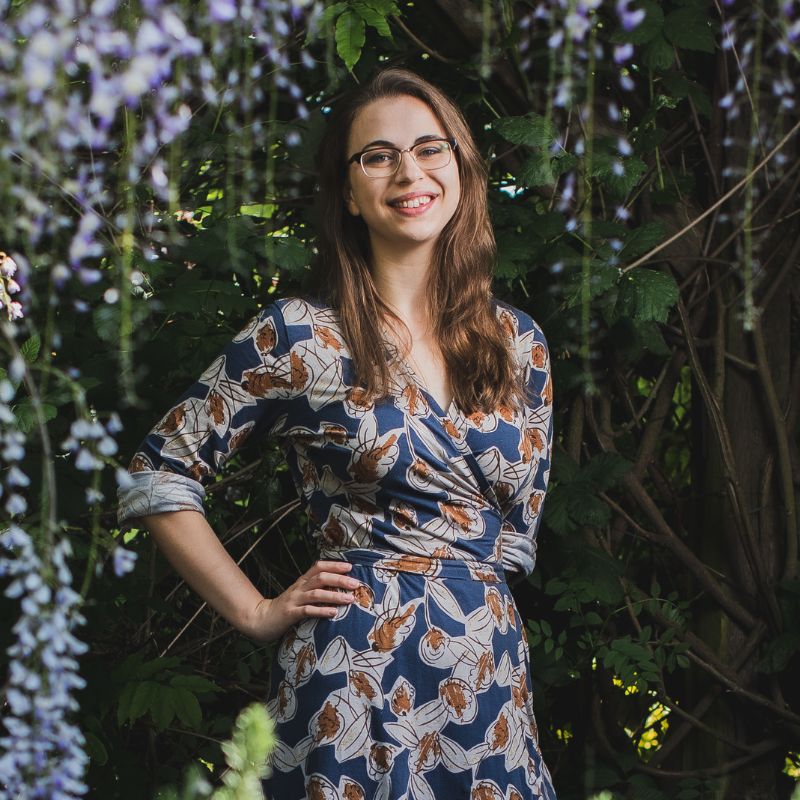
About Lillie Harris
Lillie Harris is a contemporary classical composer based in the UK. She studied at the Royal College of Music with Haris Kittos and was awarded the Elgar Memorial Prize for her final composition portfolio.
Musical from a young age, her interest in composing grew out of learning instruments, a flair for languages, and a love of creative writing; as a result, narrative ideas and complex emotions are regular features in her pieces. In recent years her twin passions for text and music have come together in the form of new choral and vocal works, including song cycles for children’s voices commissioned by Warwick: A Singing Town, and Glyndebourne, East Sussex Music, and Berwick Church.
Outside of composition, she writes the user manual for Steinberg’s notation software Dorico, sings with Covent Garden Chorus, and does engraving and copying work for publishers and film, TV, and game music recording sessions.
